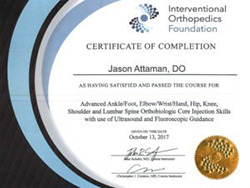Chronic headaches, including migraine headaches and tension headaches, often start in the neck. In technical terms these are known as “third occipital headaches,” because they originate in this area of the neck. Stiff muscles and issues in the vertebrae can aggravate this nerve, which in turn leads to severe headache pain.
When chiropractic care, massage therapy, acupuncture, and nerve block injections all fail you still have options. A non-invasive procedure known as radiofrequency ablation (RFA) may provide long-term pain relief.
What is radiofrequency ablation for treating chronic headaches?
RFA uses a focused burst of radiofrequency waves to generate heat, which in turn kills the occipital nerve that’s causing your headache pain. We use X-rays to place the needle with perfect precision, killing no more of the nerve tissue than is necessary to grant relief.
We also use electrical stimulation to verify we’re in the right place. We use only a mild anesthetic because we need you awake to tell us if you’re feeling those stimulations.
The needle is outfitted with an electrode. Once the needle is in place we numb the tissues around the needle, pass the current through it, and complete the procedure. Once the procedure is done you can expect to experience one to three years of long-term pain relief.
Don’t worry. It is possible to repeat the procedure when the effects start to wear off.
Is radiofrequency ablation an outpatient procedure?
Yes. We’ll perform your RFA procedure in an operating room here in our office. The procedure itself takes 20 minutes to an hour. We then keep you for observation for up to an hour more to ensure you’re not experiencing an allergic reaction.
We ask that you avoid returning to work for 24 hours. You should avoid driving after RFA, so we ask you to have a friend or family member drop you off and pick you up. We will give you after-procedure instructions to prevent other complications, such as infections.
Does radiofrequency hurt?
RFA can provide some temporary discomfort, both during the process and after. You may experience soreness and numbness at the injection site. We will give you painkillers for the first several days after the procedure. You can also treat the injection site with cold packs.
In extreme cases this pain can last for a couple of weeks. Even so, most of our patients find the years of relief from chronic headache pain are well worth enduring the temporary pain of the RFA procedure.
Does insurance cover radiofrequency?
Many insurance policies do cover RFA, including Medicare and Kaiser Permanente. Check with your insurance provider. We are happy to help you navigate the insurance process and explore your payment options.
We will try to work with you to ensure that money doesn’t stand between you and getting the relief you deserve.
Contact us to discuss treatment options for your chronic headaches
Call to set up an appointment today with Dr. Attaman. We look forward to meeting you and to discovering which treatments will ultimately end your headache pain.
